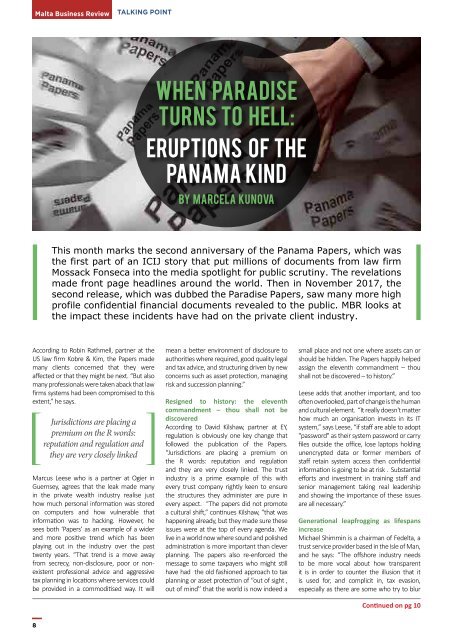MBR_ISSUE 41_Cover_LOW
You also want an ePaper? Increase the reach of your titles
YUMPU automatically turns print PDFs into web optimized ePapers that Google loves.
Malta Business Review<br />
TALKING POINT<br />
When Paradise<br />
turns to hell:<br />
Eruptions of the<br />
Panama kind<br />
By Marcela Kunova<br />
This month marks the second anniversary of the Panama Papers, which was<br />
the first part of an ICIJ story that put millions of documents from law firm<br />
Mossack Fonseca into the media spotlight for public scrutiny. The revelations<br />
made front page headlines around the world. Then in November 2017, the<br />
second release, which was dubbed the Paradise Papers, saw many more high<br />
profile confidential financial documents revealed to the public. <strong>MBR</strong> looks at<br />
the impact these incidents have had on the private client industry.<br />
According to Robin Rathmell, partner at the<br />
US law firm Kobre & Kim, the Papers made<br />
many clients concerned that they were<br />
affected or that they might be next. “But also<br />
many professionals were taken aback that law<br />
firms systems had been compromised to this<br />
extent,” he says.<br />
Jurisdictions are placing a<br />
premium on the R words:<br />
reputation and regulation and<br />
they are very closely linked<br />
Marcus Leese who is a partner at Ogier in<br />
Guernsey, agrees that the leak made many<br />
in the private wealth industry realise just<br />
how much personal information was stored<br />
on computers and how vulnerable that<br />
information was to hacking. However, he<br />
sees both ‘Papers’ as an example of a wider<br />
and more positive trend which has been<br />
playing out in the industry over the past<br />
twenty years. “That trend is a move away<br />
from secrecy, non-disclosure, poor or nonexistent<br />
professional advice and aggressive<br />
tax planning in locations where services could<br />
be provided in a commoditised way. It will<br />
mean a better environment of disclosure to<br />
authorities where required, good quality legal<br />
and tax advice, and structuring driven by new<br />
concerns such as asset protection, managing<br />
risk and succession planning.”<br />
Resigned to history: the eleventh<br />
commandment – thou shall not be<br />
discovered<br />
According to David Kilshaw, partner at EY,<br />
regulation is obviously one key change that<br />
followed the publication of the Papers.<br />
“Jurisdictions are placing a premium on<br />
the R words: reputation and regulation<br />
and they are very closely linked. The trust<br />
industry is a prime example of this with<br />
every trust company rightly keen to ensure<br />
the structures they administer are pure in<br />
every aspect. “The papers did not promote<br />
a cultural shift,” continues Kilshaw, “that was<br />
happening already, but they made sure these<br />
issues were at the top of every agenda. We<br />
live in a world now where sound and polished<br />
administration is more important than clever<br />
planning. The papers also re-enforced the<br />
message to some taxpayers who might still<br />
have had the old fashioned approach to tax<br />
planning or asset protection of ‘’out of sight ,<br />
out of mind’’ that the world is now indeed a<br />
small place and not one where assets can or<br />
should be hidden. The Papers happily helped<br />
assign the eleventh commandment – thou<br />
shall not be discovered – to history.”<br />
Leese adds that another important, and too<br />
often overlooked, part of change is the human<br />
and cultural element. “It really doesn't matter<br />
how much an organisation invests in its IT<br />
system,” says Leese, “if staff are able to adopt<br />
"password" as their system password or carry<br />
files outside the office, lose laptops holding<br />
unencrypted data or former members of<br />
staff retain system access then confidential<br />
information is going to be at risk . Substantial<br />
efforts and investment in training staff and<br />
senior management taking real leadership<br />
and showing the importance of these issues<br />
are all necessary.”<br />
Generational leapfrogging as lifespans<br />
increase<br />
Michael Shimmin is a chairman of Fedelta, a<br />
trust service provider based in the Isle of Man,<br />
and he says: “The offshore industry needs<br />
to be more vocal about how transparent<br />
it is in order to counter the illusion that it<br />
is used for, and complicit in, tax evasion,<br />
especially as there are some who try to blur<br />
Continued on pg 10<br />
8

















